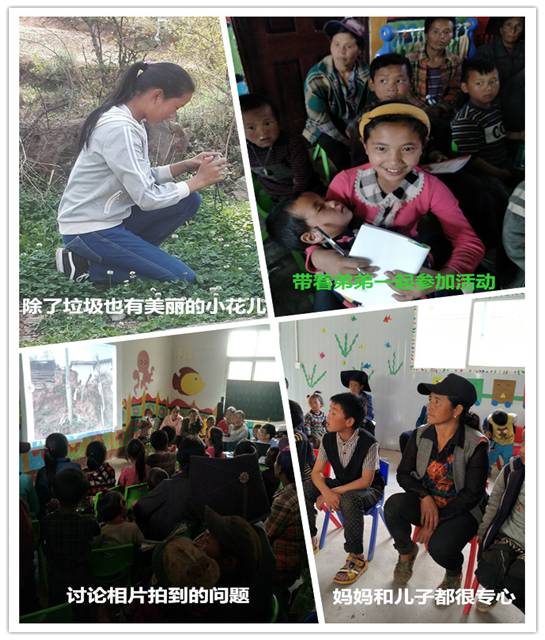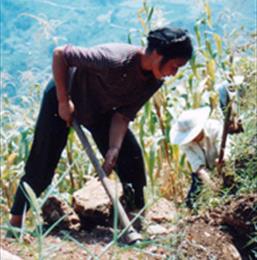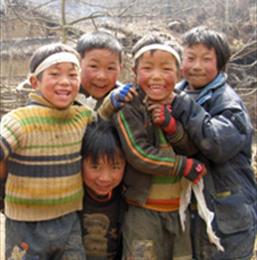Mar / May 2018No. 142
31st May 2018
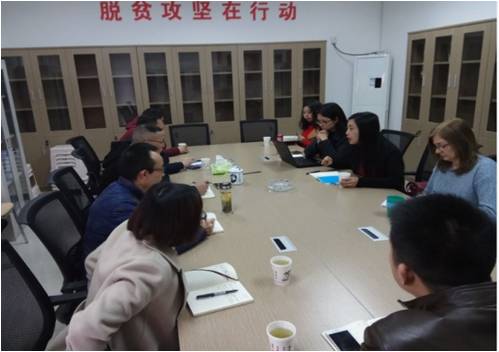
Meeting with Leaders from Yingjing County
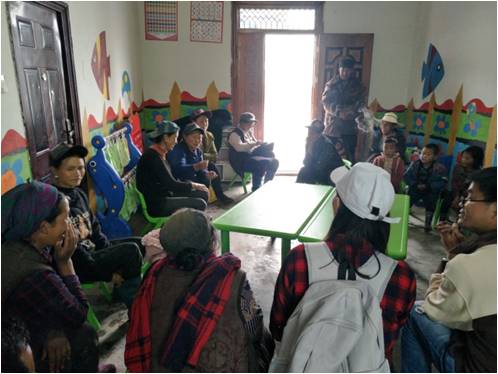
Training on Healthy Kitchen for Women from Siguojue Village, Xide County
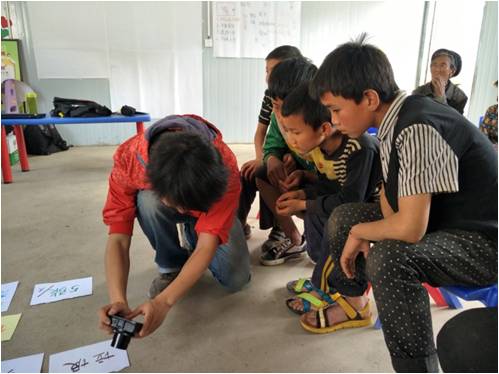
Teaching Children How to Film Nice Photos
Project Progress
Projects to Improve Livelihood
Progress of the Income-generating Projects
In late March, DORS supported 6 households to raise chickens and one to open a small shop in Yingjing. The chicken-raising households mostly raise chickens within fences or under trees, each with around 30 chickens. We supported the shop to replace old shelves and also to increase the types of goods, adding salt, noodles, notebooks for children and other appropriate goods to the original inventory of cigarettes, wine and snacks. We also constantly encouraged the shop owner to develop the habit of keeping accounts, operate to meet villagers’ needs and keep innovating, making the business sustainable.
7 more households joined the beneficiary list in April, 6 from Daping and 1 from Tazishan.1 household plans to sell grilled food to increase income, the other will raise chickens. Another 18 households joined the project in May, 17 of them are from the 2 communities. They chose various livelihood items, one for fish-farming, one for cold bean jelly,15 for chicken-raising. So far, the project has supported 55 households from the 2 communities.

Chickens from the supported household Shop run by supported family
Training in Pig-raising
From 21 to 22, April, Mr. Wei, a successful pig-raising farmer from Pianma Village, Hanyuan County, was invited to Tazishan community to give a training on pig breeding management for 14 households there. He visited households, answered questions, explained key techniques related to pig breeding, especially how to raise piglets. He even demonstrated how to operate on a sick pig. We hope this training will improve local villagers’ pig-raising techniques.
 Mr. Wei communicating with villagers Mr. Wei operating on sick pig
Mr. Wei communicating with villagers Mr. Wei operating on sick pig
Build Manure Pits
We helped villagers build 13 manure pits. DORS had supported 14 households to raise pigs since Jun 2017, in order to prevent environmental pollution caused by improper processing of pig waste while supporting local economic development, on 20 March, DORS and villagers discussed and planed the 13 manure pits. DORS provided fund and villagers provided labor. The only one pig-raising household that didn’t build the manure pit was due to lack of labor.
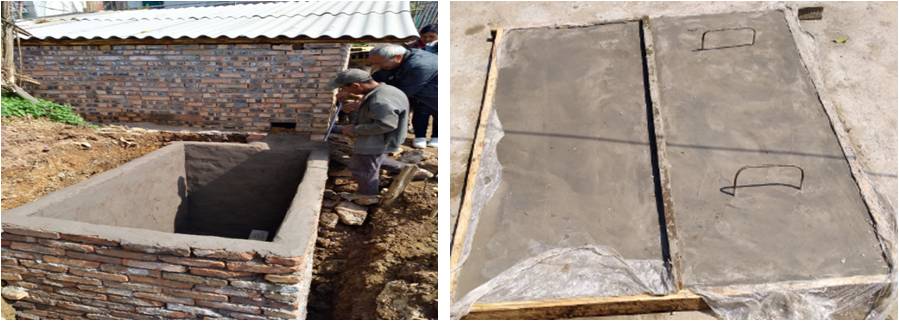
Manure pit under construction Pit lid
Establish Contact with Veterinarian
Farmers raising pigs in Tazishan used to fetch ‘barefoot’ doctors to care for sick pigs, but quite often the doctors couldn’t solve the problem, yet farmers didn’t have any alternatives. In May, DORS staff invited a professional veterinarian from Huatan town to treat the sick pig of a farmer from Tazishan. Afterwards the veterinarian gave his contact as well as the contact of the veterinarian who is specially in charge of the Tazishan area. The farmer can call them directly in case of any problems.
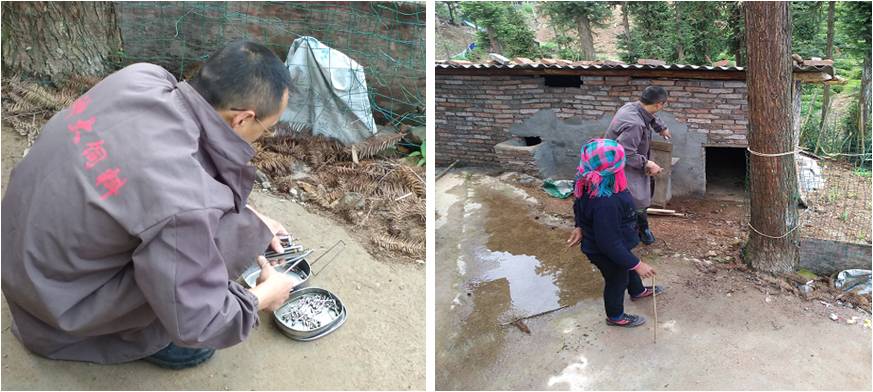
Veterinarian treating sick sow
Hygiene and Health
Women’s Health Education Activities
Two consultants from Chengdu Homeland Action Public Service Centre were invited by DORS to Siguojue and Machang villages in Xide County, Liangshan Prefecture to organise a series of 3 activities concerning hygiene and health.
The first activity, centered on How to Maintain a Healthy Body, opened in the two villages in March. 160 participants joined the activity altogether, including women and students. The activity was aimed to raise villagers’ awareness of personal and family environmental hygiene through minor daily issues, as a warm up of later activities. During the activity, the students showed a good understanding of the cases in PPT and were shocked by the consequences caused by environmental pollution. However, when asked if there was any pollution in their community, their answers were negative. It is evident that the potential community problems and risks have not become part of the students’ observation and knowledge system – it can be a long process to change residents’ awareness of hygiene and health. Generally, this meeting had drawn a large number of participants, who were well prepared for the next activity in the series, besides, they were much more familiar with us.
The second was held in April, and the two consultants introduced the means of Healthy Ramble, asking children and their mothers to photograph beautiful items as well as hygiene problems existing in the community, hoping to increase the subjects’ awareness of kitchen hygiene, hazardous rubbish and pollution caused by excrement and urine. Photographing and recording these things appealed to students as it’s funny and varied.
The focus of this activity included: rubbish littering, animals exposed around houses, all kinds of waste water being poured into roads and land without being processed. More than 50 participants from the two villages were involved and photos taken by some women from Siguojue Village were of high quality. We try to praise their photography, organization and coordination on various occasions as much as possible to encourage their confidence. We successfully visited and studied the community with the people interested in the activity, which would help us expand community activities, select leading members and building primary management teams in the future.
Discussing problems photographed Absorbed mother and her son
Healthy Kitchens
In May came the third activity, with the topic on How to Improve Kitchen Conditions. We invited villagers to discuss the issue starting with questions such as What have you got in your kitchen? What do we do in the kitchen? What is healthy and what can be harmful in the kitchen? etc. In the end, a household was selected from volunteer households. Everyone worked together to improve the kitchen in terms of cleaning of the kitchenware, storage of tableware and lighting, etc. More than 30 women from the two villages took part in the activity and despite the language barrier, we could clearly feel a rise in interest from the women and improvement in interaction. The women’s growing involvement was largely due to the topic of Healthy Kitchens, which was close to their daily life and the earlier project of fuel-efficient stoves.
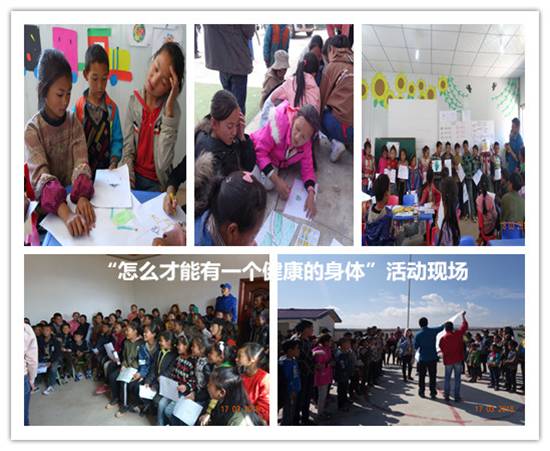
Pictures from the Activity How to Maintain a Healthy Body
Installing Water Heaters and Washing Basins
Altogether DORS supported 64 households to be equipped with a water heater and a washing basin. We, along with the representative villagers, made price enquiries and eventually selected the provider.
The water heaters and basins were all installed for all the 64 households in Tazishan in April. Although all the households have access to running water, it’s inconvenient to wash hands or take a shower without a water heater and a basin in the washroom. Therefore, we supported all the households to be equipped altogether in response to villagers’ firm request. We hope these facilities will further improve the personal and family hygiene conditions for these households.
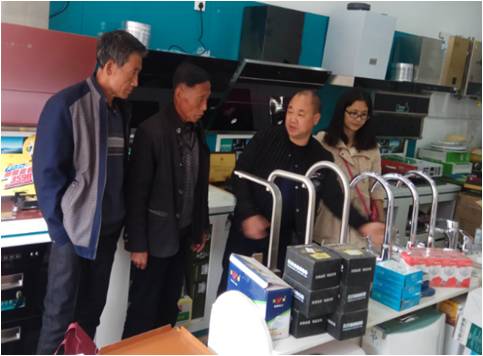
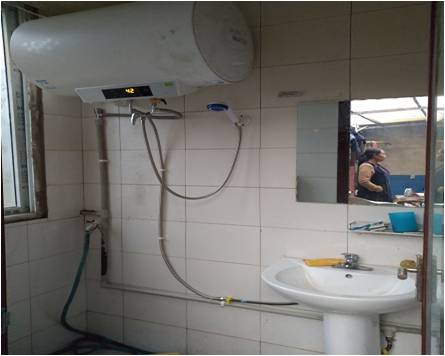
Representatives inquiring about prices Installed heater and basin
Testing Water Quality
To make sure there is secure drinking water for villagers, we invited a certified third-party organization to test the water quality for hamlets 1 and 5 from Tazishan community, the test results have not yet come out. DORS will treat the water if the results suggest it is necessary.
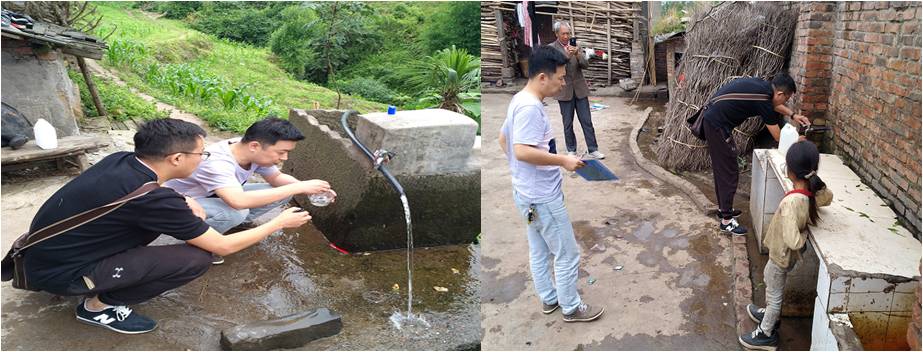
Staff from the Organization collecting water samples from the Community
Learning/Communication/Contact/Visit
Capacity Building for Cooperatives
Training and visits to Chongqing arranged by Xiaoqing were carried out in April, a total of 12 villager representatives from 8 cooperatives in 5 villages in Hanyuan County participated. The representatives were attentive all the way throughout the study tour, based on Xiaoqing’s problem analysis and introduction of the visited site before we set out. They took photos carefully when seeing people on site using various yet safe methods to produce and process rural produce, hoping to put these methods into practice when they return home. Each cooperative reflected on their current problems after the visit, hoping to improve with the help from DORS. They told us the first step is to involve more members who truly welcome cooperation to take actions together, for instance, to unify the management of walnut farming.
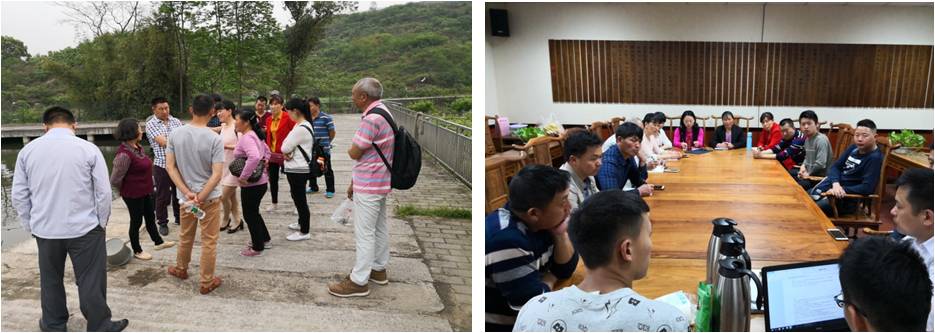
Study tour to Chongqing City
Fuel-efficient Stove
In order to give the stove-building technician a break to celebrate Chinese New year, we examined 131 fuel-efficient stoves in Siguojue Village and disbursed the fund in early February before the festival, which also promptly rewarded the participants’ initiative. By the end of April, the building of the stoves was almost finished, waiting to be examined.

Woman using Fuel-efficient Stove Disbursing fund
Education
We looked into why some children failed to attend kindergarten in Taizishan community, talking to related families and kindergarten teachers to find out the reasons. On 22 April, we funded 35 children each 500 RMB, helping these children of school age to attend the Tazishan Kindergarten in the community.
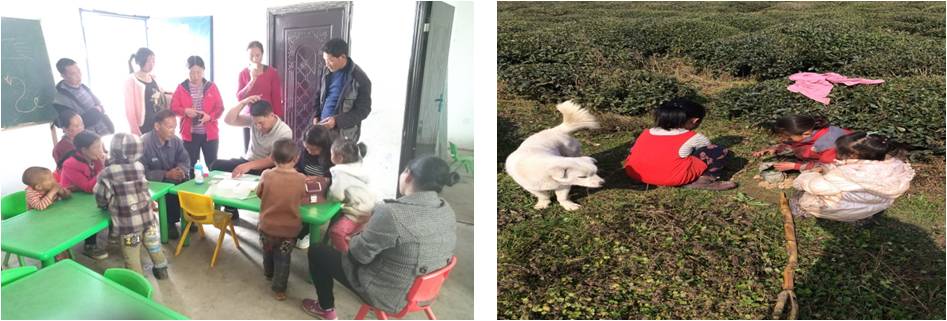
Funded families signing papers Children playing by the roadside
Rose Visits
DORS founder Miss Rose visited Tazishan and Daping communities again on March 10, which she last visited two years ago. By visiting the project villages, she noticed the changes in women from the communities. Women were hiding from her two years ago, unwilling to communicate with visitors, now they really get on with DORS staff and communicate with us quite a lot.

Rose talking to leader of women’s team Rose shaking hands with a villager
On March 11, Rose and project staff visited Yingijing Poverty Alleviation and Migration Bureau, Department of Ethnic & Religious Affairs and Minjian Township Council. DORS staff introduced the progress of onging projects and shared the problems encountered while implementing projects. All parties discussed some possible solutions and schemes. Rose expressed her thanks to all government departments and bureaux for their support for DORS projects in the past two years.

